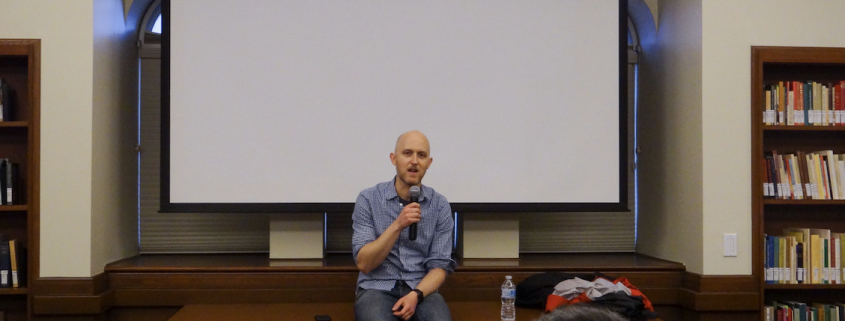Panelists discuss climate change

Approximately 50 students attended an interdisciplinary discussion on climate change and its impact hosted by the USC Sidney Harman Academy for Polymathic Study Wednesday. At the event, which is the third installation of the Spring 2019 Polymathic Pizza series, assistant professor of international relations Shannon Gibson, and assistant professor of civil and environmental engineering George Ban-Weiss spoke about how each of their fields is impacted by climate change.
The event was moderated by Sidney Harman Academy Director Tara McPherson.
“This spring series is looking at big problems or hot-button issues in bringing together scholars from different methodologies and training for a conversation,” McPherson said.
According to the academy’s website, polymathy is utilizing a variety of interests and skills to innovate and solve problems. The Polymathic Pizza series pairs two professors from different fields in a discussion of critical issues facing society to highlight how various approaches and perspectives can come together to reach a solution.
“The Academy was created to give the very inquisitive, intellectually-curious students of USC a way to operate outside the confines of their discipline and think about how problems might be tackled across disciplinary divides using polymathic methods,” McPherson said.
Gibson and Ban-Weiss each gave 10-minute presentations on their research and approaches toward proposing solutions to climate change.
Gibson spoke about the effects of climate change on international politics. Citing Ban Ki-moon, the former secretary general of the United Nations, Gibson said that many issues facing the world are interconnected.
“Saving our planet, lifting people out of poverty, advancing economic growth … these are one and the same fight,” Gibson said. “Solutions to one problem must be solutions for all.”
Gibson’s research studies the role societal participation plays in politics, primarily from her perspective as an environmentalist and activist.
“One thing about me is that I’m a self-avowed scholar-activist,” Gibson said. “I consider myself an environmentalist, and I am a participant in a number of environmental NGOs.”
McPherson said she observed a distinction between two “societies” — civil and uncivil — which demonstrate the uneven effects of climate change on groups that suffer socially and economically.
“A lot of these groups are already vulnerable to the effects of climate change,” Gibson said. “It was these groups that tend to suffer disproportionately from climate change who are often denied access to environmental benefits — things like clean water, sanitation — and are historically denied access to decision making.”
Ban-Weiss’ research uses field observations and quantitative models to study air pollution and climate change. Ban-Weiss said he tackles issues practically and locally rather than globally, since change on a massive scale is much harder to accomplish.
“The research that I do looks at climate change and air pollution but at a more local level — at the urban scale,” Ban-Weiss said. “The question is what can be done at a local level to actually affect the climate of your city.”
One aspect of Ban-Weiss’ research focuses on how materials used to construct urban buildings contribute to climate change. His team has proposed adopting “cool roofs,” which reflect sunlight instead of absorbing it and could reduce Los Angeles’ average temperature by one or two degrees Fahrenheit.
“Materials in cities, like asphalt pavements and rooftops, historically are very dark and absorb a lot of sunlight,” Ban-Weiss said. “Part of the research that I do is [explore], ‘In what ways can we brighten up materials?’”
Ban-Weiss said his polymathic endeavors include performing songs about the environment on bass in order to impact broader communities.
“It’s a musical concert that has a song cycle, —[the band] refers to it as a ‘Love Letter to the Ocean,’” Ban-Weiss said. “It goes through different parts that are environmentally related.”
Following Ban-Weiss’ presentation, McPherson led a discussion about societal indifference toward climate change. Gibson said the indifference stems from the fact that western communities often don’t experience the effects of global warming firsthand.
“In the United States, in Europe, in certain places, we don’t necessarily see or feel the tangible effects of climate change because we are, [for the most part], very much disconnected from the ecosystem,” Gibson said.
Hana Craft, a junior majoring in psychology, said she found the event to be thought-provoking.
“It was really so profound to hear from people who have been working for years, even decades, toward understanding this topic and the ways that solutions may have negative impacts and positive impacts,” Craft said.

